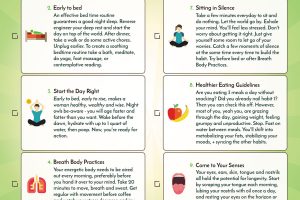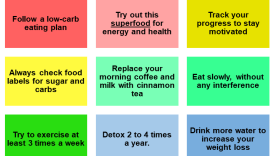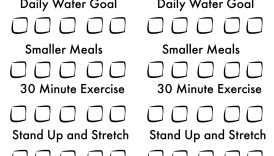The Key to a Long and Healthy Life: 10 Essential Habits

Importance of Healthy Habits
Embarking on the journey towards a healthier lifestyle begins with the adoption of healthy habits. These choices significantly influence daily life, mental clarity, and overall well-being. It’s not just about the occasional salad or hit at the gym; it’s about consistently integrating these habits into daily routines. For instance, someone who chooses to take the stairs instead of the elevator is subtly reinforcing their commitment to an active lifestyle. Moreover, a balanced breakfast can set a positive tone for the entire day by enhancing energy levels and focus. To encapsulate, here are a few essential healthy habits:
- The Key to a Long and Healthy Life: 10 Essential Habits
- Importance of Healthy Habits
- Impact on Longevity
- Balanced Diet
- Importance of Nutrient-Rich Foods
- Hydration Practices
- Regular Exercise
- Benefits of Physical Activity
- Different Types of Workouts
- Quality Sleep
- Sleep Hygiene Tips
- Effects of Sleep on Health
- Stress Management
- Techniques to Reduce Stress
- Impact of Stress on Health
- Social Connections
- Importance of Relationships
- Social Activities for Well-being
- Mental Health
- Strategies for Mental Wellness
- Seeking Professional Help
- Regular Health Check-ups
- Importance of Preventive Care
- Recommended Screening Tests
- Healthy Weight Management
- Tips for Weight Control
- Effects of Obesity on Health
- Limiting Alcohol and Tobacco
- Risks of Excessive Drinking
- Dangers of Smoking
- Balanced Diet: Prioritize whole foods, fruits, and vegetables.
- Regular Exercise: Engage in various physical activities throughout the week.
- Quality Sleep: Aim for 7-9 hours of sleep each night.
Impact on Longevity
Adopting healthy habits doesn’t just enhance life; it extends it. Research has shown that individuals who maintain a healthy lifestyle enjoy a longer lifespan, often characterized by a greater quality of life. Consider this:
- Active individuals tend to reduce their risk of chronic diseases, such as heart disease and diabetes.
- Eating a nutrient-dense diet correlates with lower mortality rates.
With each healthy choice made, the body is more equipped to ward off illness and disease, keeping one vibrant and engaged for years to come. Overall, cultivating healthy habits is a powerful investment in one’s future.
Balanced Diet
Importance of Nutrient-Rich Foods
Continuing the journey towards a healthier lifestyle, a balanced diet is at the forefront. Adopting nutrient-rich foods significantly contributes to overall health and well-being. These foods provide essential vitamins, minerals, and antioxidants necessary for the body to function optimally. For instance, consider someone who incorporates kale, quinoa, and berries into their diet. Not only do these foods offer vital nutrients, but they also enhance energy levels and support immune function. Here are a few key benefits of nutrient-rich foods:
- Boost Mental Clarity: Foods like fatty fish and nuts improve brain health.
- Support Healthy Weight Management: Whole grains and fiber-rich foods keep you satisfied longer.
- Enhance Longevity: A diet rich in fruits and vegetables is linked to a longer lifespan.
Hydration Practices
Equally important to a balanced diet is proper hydration. Water is often underrated, but it plays a crucial role in every bodily function. Staying adequately hydrated can transform your mood, energy level, and clarity. To make hydration part of daily habits:
- Drink Water Before Meals: This can aid digestion and help with portion control.
- Set Reminders: Use apps or phone alarms to remind you to drink water.
- Infuse Flavor: Adding slices of fruits like lemon or cucumber can make drinking water more enjoyable.
By prioritizing both nutrient-rich foods and proper hydration, individuals set themselves on a path to vibrant health, ensuring their bodies are well-fueled and ready to take on the day.
Regular Exercise
Benefits of Physical Activity
Transitioning from a balanced diet, the importance of regular exercise cannot be overstated. Engaging in physical activity offers a multitude of benefits that go beyond just weight management. For instance, after adopting a regular exercise routine, many individuals report increased energy levels and improved mood due to the release of endorphins, often referred to as the “feel-good” hormones. Consider these key benefits of physical activity:
- Enhances Heart Health: Regular workouts improve cardiovascular fitness and lower blood pressure.
- Boosts Mental Well-being: Activities like jogging or yoga can reduce anxiety and depression.
- Improves Sleep Quality: Those who exercise regularly tend to enjoy deeper, more restorative sleep.
Different Types of Workouts
Diversity in workouts is vital to keep motivation high and prevent boredom. Here are a few types of workouts that individuals can incorporate:
- Cardiovascular Exercises: Running, cycling, and swimming help elevate heart rate and burn calories.
- Strength Training: Using weights or bodyweight exercises like squats and push-ups builds muscle mass and boosts metabolism.
- Flexibility and Balance: Incorporating yoga or Pilates not only enhances flexibility but also promotes mindfulness.
By exploring various workout styles, individuals can discover what resonates with them, making regular exercise an enjoyable part of their daily lives.
Quality Sleep
Sleep Hygiene Tips
As we continue our focus on wellness, let’s not overlook the significance of quality sleep. Good sleep hygiene is the first step towards achieving restful nights and alert days. Implementing simple habits can significantly enhance the sleep experience. For instance, someone who establishes a relaxing bedtime routine often finds it easier to drift off. Here are some effective sleep hygiene tips:
- Maintain a Consistent Schedule: Go to bed and wake up at the same time every day, even on weekends.
- Create a Sleep-Inducing Environment: Ensure your bedroom is cool, dark, and quiet.
- Limit Screen Time Before Bed: The blue light emitted by phones and computers can disrupt the body’s natural sleep cycle, so aim to switch off devices an hour before bedtime.
Effects of Sleep on Health
Quality sleep does wonders for overall health, acting as a restorative process for both body and mind. Insufficient sleep can lead to a host of health issues, including weakened immune function and increased stress levels. Some key effects of quality sleep include:
- Enhanced Cognitive Function: A good night’s rest sharpens memory and improves decision-making.
- Weight Management: Sleep influences hormones that control appetite, making it easier to maintain a healthy weight.
- Emotional Stability: Adequate sleep reduces irritability and enhances mood.
Prioritizing sleep is not a luxury; it’s a necessity that plays a vital role in achieving holistic health.
Stress Management
Techniques to Reduce Stress
Following our discussion on quality sleep, let’s dive into another essential aspect of wellness: stress management. In today’s fast-paced world, effective stress-reduction techniques can be game changers for mental and physical health. Simple practices can cause significant shifts in how we handle daily pressures. For example, many individuals find that incorporating mindfulness or meditation into their routine helps clear mental clutter. Here are some techniques to reduce stress:
- Deep Breathing Exercises: Take a few minutes each day to breathe deeply, which helps calm the nervous system.
- Physical Activity: Engaging in exercise, even brisk walking, can release endorphins and improve mood.
- Journaling: Writing down thoughts and feelings can help in processing stress and recognizing patterns.
Impact of Stress on Health
Managing stress is crucial because chronic stress can wreak havoc on overall health. When stress levels remain high, it can lead to various health issues that take a toll on well-being. Consider these impacts of unmanaged stress:
- Weakened Immune System: Persistent stress can make you more susceptible to illnesses.
- Increased Risk of Chronic Conditions: Stress is linked to heart disease, obesity, and diabetes.
- Mental Health Issues: Long-term stress can exacerbate anxiety and depression.
By adopting effective stress management techniques, individuals can significantly improve their health and enhance their quality of life.
Social Connections
Importance of Relationships
Building on the theme of stress management, let’s explore the vital role social connections play in maintaining overall health and well-being. Positive relationships can provide emotional support, reduce feelings of loneliness, and enhance life satisfaction. Many people often find that sharing life’s ups and downs with friends or family can lighten burdens and provide meaningful perspectives. Research shows that strong social bonds can lead to:
- Improved Mental Health: Regular interaction with loved ones can decrease feelings of anxiety and depression.
- Increased Longevity: Studies suggest that those with solid social connections often live longer, healthier lives.
- Enhanced Resilience: Having a support network can help individuals cope with stress better.
Social Activities for Well-being
To foster these invaluable relationships, engaging in social activities is essential. Whether it’s joining a local club or simply reaching out to friends, being active socially can uplift spirits and nurture connections. Here are some enjoyable social activities to consider:
- Participate in Group Classes: Yoga, art, or cooking classes can blend learning with social interaction.
- Volunteer: Giving back to the community not only helps others but also encourages camaraderie.
- Plan Regular Gatherings: Simple get-togethers, like potlucks or game nights, can strengthen bonds with friends and family.
By prioritizing social connections and engaging in fulfilling activities, individuals can enrich their lives, enhance their mental well-being, and ultimately lead a happier existence.
Mental Health
Strategies for Mental Wellness
As we continue from the discussion of social connections, it’s essential to delve into mental health. Prioritizing mental wellness is crucial for navigating life’s challenges and maintaining overall health. Simple yet effective strategies can empower individuals to foster a positive mindset. For example, practicing gratitude has become a daily ritual for many. Taking a moment each day to acknowledge things to be thankful for can shift perspectives. Here are some helpful strategies for mental wellness:
- Establish a Routine: Consistency can bring a sense of stability and calm.
- Engage in Creative Hobbies: Activities like painting, writing, or playing music can serve as therapeutic outlets.
- Mindfulness and Meditation: These practices help maintain focus on the present and reduce anxiety.
Seeking Professional Help
Sometimes, despite our best efforts, we may find that self-help strategies are not enough. It’s perfectly okay to seek professional help when feeling overwhelmed. Mental health professionals, such as therapists or counselors, can provide tools and insights that make a difference. Examples of when to seek help include:
- Persistent Feelings of Sadness: If feelings of sadness linger for weeks and interfere with daily life.
- Difficulty Coping: If challenges seem insurmountable despite efforts to manage them.
- Changes in Behavior or Mood: Sudden shifts in behavior that concern oneself or loved ones.
Remember, reaching out for help is a sign of strength and can pave the way towards a healthier mental state. Prioritizing mental health is as essential as maintaining physical health, laying a solid foundation for a fulfilling life.
Regular Health Check-ups
Importance of Preventive Care
Continuing from our focus on mental health, let’s shift our attention to the vital role of regular health check-ups. Preventive care is your first line of defense against potential health issues. Regular check-ups can lead to early detection of conditions, often making treatment more manageable and effective. For example, a friend recently discovered high cholesterol levels during a routine check-up, which prompted lifestyle changes before serious issues arose. Here’s why preventive care is essential:
- Early Detection: Many conditions, such as diabetes or hypertension, have few noticeable symptoms initially but can lead to severe complications.
- Health Education: Regular visits enable providers to educate patients about health practices tailored to their individual needs.
- Building a Relationship with Healthcare Providers: Regular visits foster trust and open communication with medical professionals.
Recommended Screening Tests
To maximize the benefits of preventive care, staying informed about recommended screening tests is crucial. These tests vary based on age, health history, and risk factors but generally include:
- Blood Pressure Screening: At least once every two years for adults.
- Cholesterol Tests: Starting at age 20, every 4–6 years or as advised.
- Blood Sugar Tests: Particularly for those at risk for diabetes, every three years from age 45.
By prioritizing regular health check-ups and understanding necessary screenings, individuals can take proactive steps towards a healthier life, ensuring that their health remains a top priority.
Healthy Weight Management
Tips for Weight Control
Building on the theme of regular health check-ups, let’s explore the crucial topic of healthy weight management. Maintaining a healthy weight is not merely about aesthetics; it’s essential for overall health. Practical tips can make a significant difference in achieving and sustaining a healthy weight. For instance, individuals embarking on a weight control journey often find success by tracking their meals and exercise. Here are some useful tips for effective weight management:
- Set Realistic Goals: Aim for gradual changes, setting achievable milestones to avoid disappointment.
- Practice portion control: Being mindful of serving sizes can help prevent overeating.
- Incorporate Regular Physical Activity: Aim for at least 150 minutes of moderate aerobic activity weekly.
Effects of Obesity on Health
Managing weight is vital, as obesity can lead to various health complications. When excess weight becomes a chronic issue, it may result in significant long-term risks. Consider the following impacts of obesity:
- Increased Risk of Chronic Diseases: Conditions such as type 2 diabetes, heart disease, and certain cancers are linked to obesity.
- Joint Problems: Extra weight can strain joints, leading to arthritis and mobility issues.
- Sleep Apnea: Obesity is a leading risk factor for sleep apnea, disrupting restful sleep.
By adopting effective weight management strategies and staying informed about the risks of obesity, individuals can cultivate a healthier lifestyle that not only improves their appearance but also enhances their quality of life.
Limiting Alcohol and Tobacco
Risks of Excessive Drinking
Continuing our conversation on managing health, let’s address the importance of limiting alcohol and tobacco use. Alcohol, while often socially accepted, can present numerous risks when consumed in excess. Many individuals, like a colleague who struggled with hangovers affecting productivity, realize that moderation is key. Here are some critical risks associated with excessive drinking:
- Liver Damage: Chronic heavy drinking can lead to liver diseases such as fatty liver, hepatitis, or cirrhosis.
- Mental Health Issues: Excessive alcohol consumption often exacerbates anxiety and depression.
- Addiction and Withdrawal: Over time, heavy drinking can lead to alcohol dependence, resulting in withdrawal symptoms when not consumed.
Dangers of Smoking
Equally concerning is tobacco use, which poses severe health risks. Even those who smoke socially may not realize the cumulative effects of smoking. The dangers include:
- Respiratory Problems: Smoking can lead to chronic obstructive pulmonary disease (COPD) and emphysema, complicating basic breathing.
- Cancer Risks: Tobacco is a leading cause of various cancers, including lung, throat, and mouth cancers.
- Heart Disease: Smokers are at a significantly higher risk for heart ailments, increasing the chance of heart attacks and strokes.
By recognizing the risks of excessive drinking and smoking, individuals can take proactive steps towards healthier choices, supporting their overall well-being and longevity.





